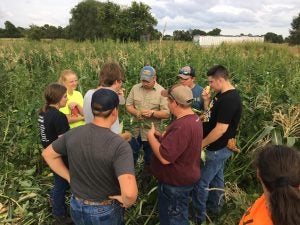It happens all the time, we see different generations collide as another comes of age to take the societal reins from the last. But things are quite a bit different this time around.
Society and agriculture are accelerating at speeds never before seen — thanks in no small part to technology and a growing general population. This means that the trans-generational shift is hitting especially hard, with impacts that will forever alter the way we consume and produce food.
Before, it was Millennials who were all the rage as they came of age to drive the food business and production. But immediately on their heels is a blend of their children and cohorts making up what is known as Generation Z. Already, we are seeing the marketing, entertainment, and political sectors paying special mind to this demographic as they become the next most influential group of the societal gears.
This generation, brought up during the height of technological advancements and shifting values, has some serious thoughts and values to bring to the tables of agriculture and food.
Who are they anyway?
Generation Z is defined by birth years falling approximately between 1997 and 2010. There is some variance on this depending on the source: Pew Research indicates the Millennial generation as ending in 1996, but the Census Bureau hasn’t drawn a hard and fast line. This means that as we entered the 2020s, we can safely say Gen Zers were between the ages of 10 and 23.
This generation has some significant markers making it stand out. Notably, it is the most ethnically diverse and largest generation in U.S. history, according to Business Insider. This age group has grown up in the midst of the internet culture and given rise to the world of “influencer marketing.” But don’t think that makes them fickle, as they are simultaneously more consumer-conscious and politically interested. This, of course, ties closely into their food choices and values.

Gen Zers have been called “food culture disruptors” based on their culinary skills (thanks to internet tutorials and recipes, many are interested in home cooking) and considerations of price, quality, and ethical concerns. They are also becoming the largest consumers of niche markets including organic, non-GMO, and plant-based alternatives — likely due to internet influence and reflecting some ideologies planted and cultivated in the Millennial generation.
With some of these hallmarks, we can get the idea of what their growing involvement in the economy and industries might look like moving forward. But keep in mind, Gen Zers are not only consumers — they are also our future farmers and ag professionals. We can expect they may be bringing some of that diversity and progressive ideologies with them as they transition older generations.
Views on agriculture
There seems to be no lack of interest in food or agriculture when it comes to Gen Z. In addition to their alternative perspectives on these types of issues, Gen Zers have expressed wanting to bring some more diverse roles as the industries grow and develop.
One study, Farmers of Tomorrow: Generation Z’s Future in Agriculture, highlighted some key differences of this demographic in agriculture compared to their BoomerXY parents.
For example, Gen Z expressed some very positive outlooks when it came to government entities, namely U.S. Department of Agriculture, Environmental Protection Agency, and Food and Drug Administration. They also hold significantly less loyalty to specific well-known brands and companies. Instead, they showed a very positive interest and outlook regarding general bio-ag technologies, pesticides, and herbicides.
According to the same study, 89 percent of Gen Z respondents are currently active in their home farm operations if they have one. However, only 54 percent indicated they intended on taking over from their parents someday. But that didn’t mean they wanted to abandon agriculture — many of them indicated they had a desire to obtain agriculture-related degrees and stay active in the field.

For anyone in the agriculture community, anecdotal experience likely tells that this isn’t a surprise. Farm succession isn’t what it once was, it’s a complicated process and sometimes involves millions of dollars worth of land and assets. And, with growing trends in the agtech, foodtech, and biotech sectors, there are increasing opportunities for younger generations to stay heavily involved in agriculture without the high risk, hard labor, and opportunity costs of staying at the home farm.
This is a good indicator of the continuation of technology, but it does still beg some questions as to what the future of farm succession will look like.
As consumers
Of course, we can’t have a discussion about the impact of Gen Z on food and agriculture without addressing them as consumers. The pandemic has been a strong indicator for what kind of behaviors we can expect to see continue. With the increase in online spending, many Gen Zers have indicated that they intend to continue. Over half of them are more likely to include food in their online shopping habits compared to their older peers.
When it comes to buying choices, many of them are also putting more emphasis on things like health, quality, and transparency. But while they are increasingly choice conscious, Gen Z is notably more open to the technology behind food production.
» Related: Study shows next-gen farmers & consumers interest in food system
According to a Food Tech Consumer Perception study, a whopping 77 percent of Gen Z is willing to eat foods derived from CRISPR and GMO technologies. In this same vein, it also seems to make them prime consumers for the growing alternative meat market — including lab-based “meats.” However, that’s not yet the case, as research shows 72 percent of Gen Z were not ready to accept such products and tended to “view it with disgust.”
But being more ethnically diverse, and widely swayed by the influencer culture of the internet, there is plenty of room to capitalize on products and meals a bit off the beaten path and less mainstream. Keep in mind, like their Millennial counterparts, Gen Zers have been noted for experimenting with different diet fads like paleo, keto, and vegetarian.
Looking forward
There’s no doubt about it, we are on the brink of a new frontier of sorts for our world and food systems. What makes the changes so significant is the number of possibilities continually unfolding. As more changes, the gaps of time between our generations grow increasingly significant.
The challenges and issues all generations face continue to be ongoing, and not a single one has all the answers. But a positive is that as things inevitably change, we have a budding generation eager and willing to meet them.
Despite the wide spectrum of generations now sharing society — Boomers, Gen XY, Millennials, and Gen Z — food remains a common denominator we all share. While separated by time and values, coming to an understanding is pivotal to our future. At the agricultural table, discussion and decisions must come from the best of all our experiences and perceptions.
Jaclyn Krymowski is a recent graduate of The Ohio State University with a major in animal industries and minor in agriculture communications. She is an enthusiastic “agvocate,” professional freelance writer, and blogs at the-herdbook.com.



